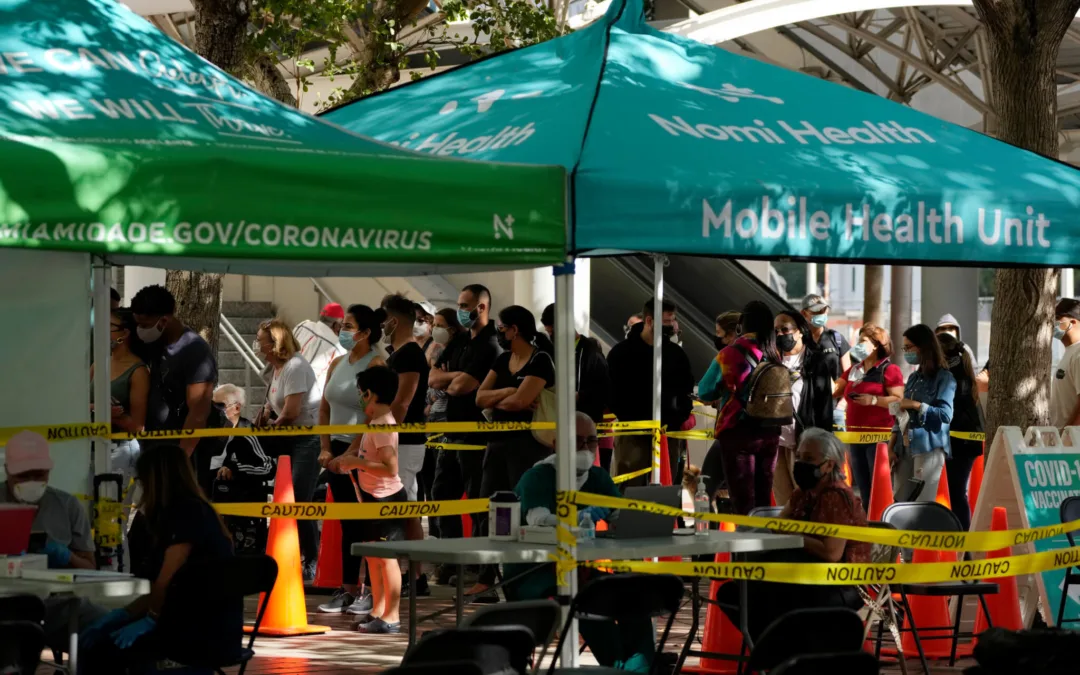
image via Shutterstock
Nearly 300,000 Spanish-speaking students in Florida will have to take a test in person at a time when COVID cases are on the rise.
Nearly 300,000 Spanish-speaking students in Florida could be at risk if the local Department of Education does not postpone testing or offer a remote option for taking an English proficiency test known as ACCESS for ELLs (English Language Learners).
The nonprofit organization Alianza Center, along with the Florida division of the League of United Latin American Citizens (LULAC), are asking Florida Education Commissioner Richard Corcoran to delay the test.
ACCESS testing is programmed to begin on Jan. 25. The test is offered annually to English-language learners in grades K-12.
RELATED: ‘Florida Is in Full Pandemic Resurgence,’ Says White House COVID-19 Task Force
“The test is given to all students who are learning English as a second language,” Johanna López, executive director of Alianza Center, told The Americano. “They can be Haitians, Nigerians, Puerto Ricans, Dominicans, or children who are born in the United States but speak another language at home.”
López said the Department of Education’s decision puts at risk thousands of students who in many cases have been in lockdown in the state since the pandemic began in March.
In-person classes began last October in Florida. Parents have the choice to send kids to school or have them remain in virtual mode.
López said her initiative’s concern is that this is not the right time to administer the test. COVID numbers are rising once again in Florida.
“The test should be postponed—parents need to be advised that if they decide to not bring their children, there will be no consequence to the child’s grade or any other academic consequence,” López said. “We don’t know if there are children with high-risk conditions or a family member living with them who has a condition.”
The director said this exposure would put not only hundreds of thousands of children at risk, but also their families, teachers, and other school personnel.
“There is also a psychological aspect involved,” López said. “Let’s think about a family with few resources—who has lost their jobs or property. Add to that the pressure of taking a test when academic achievement in the nation is strained.”
López said other jurisdictions, like Colorado, have determined that safety comes first, deciding to postpone the exam or allowing it remotely.
RELATED: Two COVID-19 Vaccines Have Arrived in Florida. Who’s Next in Line to Get Vaccinated?
“This is not something new; it’s being done in other states,” López said. “It’s really about respecting human life—not allowing these children to go to school—and respecting parents’ decisions.”
The Alianza Center director said the Department of Education could provide the test at the end of the semester or during the summer if there are fewer cases of coronavirus—especially since teachers will presumably soon begin to be inoculated.
Politics

Teamsters and UPS Reach Tentative Deal to Avoid Strike, 340,000 Workers to Get Raises
The tentative deal represents a huge win for full- and part-time UPS Teamster workers, who would get significant pay raises and better working...



One Republican Senator Is Blocking 265 Military Promotions, Leaving the Marines Without a Confirmed Leader
Sen. Tommy Tuberville's decision means these military officers are not getting the pay raises they’re owed, cannot move their families to wherever...
Local News



Teamsters and UPS Reach Tentative Deal to Avoid Strike, 340,000 Workers to Get Raises
The tentative deal represents a huge win for full- and part-time UPS Teamster workers, who would get significant pay raises and better working...



One Republican Senator Is Blocking 265 Military Promotions, Leaving the Marines Without a Confirmed Leader
Sen. Tommy Tuberville's decision means these military officers are not getting the pay raises they’re owed, cannot move their families to wherever...




